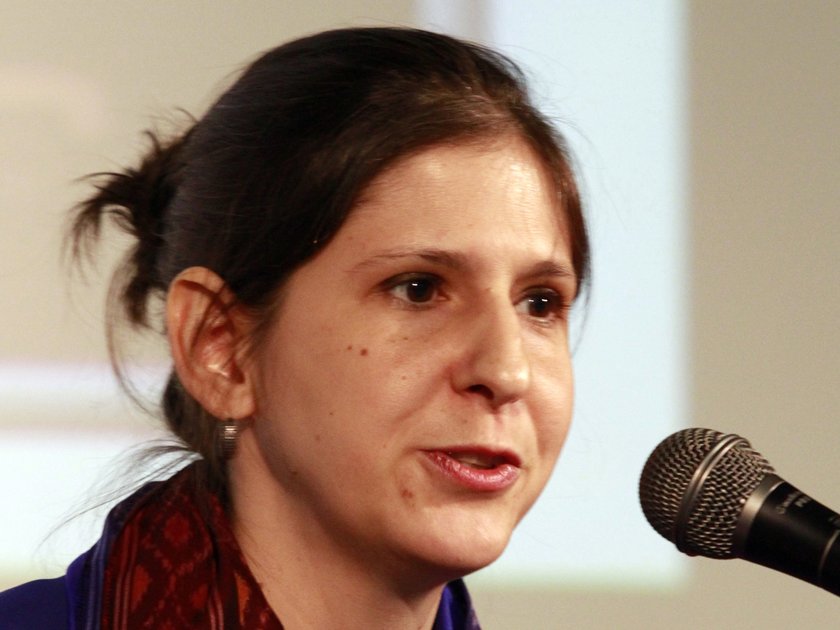Democracy, as we understand it traditionally, has to be updated and changed for the digital age, said Anja Kovacs, Director of the Internet Democracy Project. The Internet, Ms. Kovacs explained, has upset the traditional social contract that existed between the state and citizens.
“What you see now with the advent of technology, especially driven by the Internet, is that states now have another very important power that is unprecedented in a way, and that is the power of mass surveillance.”
She argued that if states do not, at the same time, step up the protection of human rights, freedom of expression, and privacy, then the traditional social contact, in practice, becomes non-existent.
In India, where the Internet Democracy Project is based, there’s been a lot of political goodwill toward Internet technology for the betterment of people, Ms. Kovacs said, giving the example of some states making birth certificates and death certificates available in computer service centers in rural areas. Although not everything works equally, she noted that there’s been a lot of work and interest in this direction.
This interview was conducted by the ICM’s Nadia Mughal and was part of a series of interviews done on the margins of ICM’s seventh retreat, on the impact of new technology on peace, security, and development, held on October 23-24.
In what ways has the Internet challenged our understanding of democracy?
I think one of the really fundamental ways in which the Internet actually has reconfigured democracy, in a way, is by upsetting the traditional social contract that existed between the state and citizens. If you look at political theory, in a democracy, the state will have the monopoly over the use of force—this is the social contract in democracy as it existed traditionally.
What you see now with the advent of technology, especially driven by the Internet, is that states now have another very important power that is unprecedented in a way, and that is the power of mass surveillance. If you then not—at the same time—also step up the protection of human rights, and arguably of freedom of expression and privacy, then the traditional social contract actually, in practice, becomes non-existent. So this is one of the main—the most fundamental way perhaps—in which democracy and the democratic theory of democracy, as we understand it traditionally, has to be updated and changed for the digital age.
The Internet Democracy Project examines the impact and challenges of the Internet on democracy and social justice in India and beyond. How responsive has the Indian government been towards adapting the Internet and new technology in its governing practices?
There have been some really remarkable initiatives in India. I think there’s a lot of political goodwill to use Internet technology for the betterment of people, especially by ensuring better service delivery.
Some states within India have gone further than other states, but you kind of see that commitment across the board. This ranges from things to making birth certificates and death certificates available in computer service centers in rural areas, where otherwise people would have to travel quite far to a town to actually be able to get access to these things, to putting data of unemployment guarantee scheme online so that people can see whether the payment has actually been made according to the official system. And if there is a bottleneck somewhere where they haven’t received the money, ideally they should be able to see where that bottleneck is. Not everything has worked equally well—not all of these bottlenecks have been effectively alleviated—but there has been a lot of work and interest in that direction.
There have also been some efforts to have more consultation on some of these issues. There’s people within the Department of Electronics and Information Technology who are actually quite open and try to get broader consultation on these kinds of issues, but it isn’t always clear how that feeds into actual policies. So in that sense, the connect is still limited.
Can you expand on the concept of multistakeholderism and what it means for Internet governance?
Some people actually think that multistakeholderism is this unique thing to Internet governance and that it comes out of Internet governance as a system. That’s not really true. At its core, what it means is the involvement of all people who have a stake in an issue—in discussions and sometimes decision-making around those issues.
What is specific about the Internet is that a lot of the initial governance institutions were actually set up by the actors who developed the Internet as such. There is, for example, the IETF (Internet Engineering Task Force), which is mostly techies, and they developed their own procedures and rules to decide on when could something become a standard that can actually govern the Internet.
Those institutions are Internet-native institutions—with the Internet, these institutions grew. What’s particular about Internet governance in that sense is that in many of these places, governments for the longest time weren’t really paying any attention. It’s only really in the 2000s that governments started to realize there’s something important going on here and felt they should get more of a say in institutions, like especially ICANN (Internet Corporation for Assigned Names and Numbers), which governs the domain name system.
Where it is different than from multistakeholders in other places is that often, in other areas, governments already have a certain control and then open up to include other stakeholders. In Internet issues, it actually started in many places with other stakeholders governing already, and then governments having to be added to the mix. That’s part of the reason why it’s controversial and why not all governments are equally happy with it.

